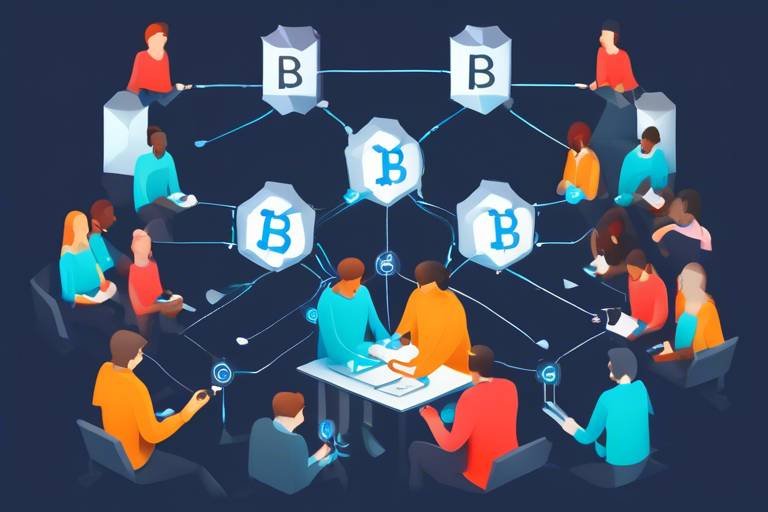Understanding the Ethical Implications of Blockchain Technology
As we dive into the world of blockchain technology, it’s essential to recognize that this innovative system is not just a technical marvel but also a catalyst for profound ethical discussions. Blockchain promises to revolutionize how we conduct transactions, manage data, and interact in a digital landscape. However, with great power comes great responsibility. The ethical implications of blockchain are vast and multifaceted, touching on issues of privacy, security, and social equity.
The rise of blockchain technology has ignited conversations about the responsibilities of developers and users alike. As we navigate this evolving landscape, we must ask ourselves: how do we balance the benefits of transparency with the need for privacy? Can we ensure that the deployment of blockchain serves to promote social equity rather than exacerbate existing inequalities? These questions are not merely academic; they are critical to shaping the future of technology in a way that aligns with our collective values.
Moreover, the ethical implications of blockchain are not confined to the technology itself but extend to the frameworks and systems that govern its use. Developers play a pivotal role in determining how blockchain applications function and who they benefit. Consequently, their ethical considerations can significantly impact the wider community. With the potential for misuse or flawed implementations, the onus is on developers to create systems that uphold ethical standards.
In this article, we will explore the various dimensions of blockchain's ethical implications, including its promise of transparency, the challenges of maintaining privacy, the impact on social equity, and the environmental concerns associated with its energy consumption. By understanding these aspects, we can better appreciate the responsibilities that come with harnessing such a transformative technology.
Blockchain technology offers unparalleled transparency in transactions, fostering trust among users. Imagine a world where every transaction is recorded on an immutable ledger, accessible to all but tamper-proof. This level of transparency can enhance accountability across various sectors, including:
- Finance: Financial institutions can improve their operations and reduce fraud.
- Supply Chain: Businesses can trace the origin of products, ensuring ethical sourcing.
- Governance: Governments can increase citizen trust through transparent voting mechanisms.
However, while transparency is a powerful tool, it also raises questions about the extent to which it should be applied. How do we protect sensitive information while promoting openness? This balance is critical in ensuring that the benefits of transparency do not come at the cost of individual privacy.
While blockchain provides transparency, it raises significant privacy issues. In a decentralized world, where data is distributed across multiple nodes, the challenge of maintaining user privacy becomes paramount. How do we ensure that users' personal information remains confidential while still leveraging the benefits of blockchain? This is a delicate dance that requires careful consideration.
Ownership of personal data is a critical ethical concern. With blockchain, individuals can potentially regain control over their data, deciding who has access to it and under what circumstances. This shift could fundamentally alter the landscape of data privacy. However, it also poses questions about the responsibilities that come with this newfound control. Are users equipped to manage their data effectively? What safeguards are in place to protect against misuse?
Smart contracts automate processes, but they also raise questions about autonomy and consent. These self-executing contracts can streamline transactions, but they can also limit individuals' ability to make decisions. As we embrace automation, we must consider the ethical implications of relinquishing control to code. Are we comfortable with machines making decisions on our behalf?
The ethical responsibility of developers in writing code for blockchain applications is paramount. Flawed or malicious code can have far-reaching consequences, affecting not just the immediate users but also the broader community. Developers must prioritize accountability, ensuring that their creations align with ethical standards and serve the greater good.
Blockchain technology has the potential to democratize access to financial services, but it can also widen the gap in social equity if not implemented thoughtfully. As we evaluate blockchain's impact, we must consider:
- How can we ensure equal access to blockchain technologies?
- What measures can be taken to prevent the marginalization of underserved communities?
By addressing these questions, we can work towards a future where blockchain serves as a bridge rather than a barrier.
The energy consumption of blockchain networks, particularly those using proof-of-work systems, raises ethical questions about sustainability. The environmental footprint of blockchain technology cannot be ignored, and as we champion innovation, we must also advocate for responsible practices.
Exploring alternative consensus mechanisms, such as proof-of-stake, can mitigate environmental concerns. These innovative approaches promote sustainability within the blockchain ecosystem and offer a viable path forward. By prioritizing eco-friendly practices, we can align technological advancement with our ethical obligation to protect the planet.
The role of corporations in adopting ethical blockchain practices is crucial. As businesses integrate blockchain into their operations, they must establish governance frameworks that ensure responsible use of this technology. This commitment to ethical practices not only enhances corporate reputation but also contributes to a more equitable digital landscape.
What is blockchain technology?
Blockchain technology is a decentralized digital ledger that records transactions across multiple computers in a way that ensures the security and transparency of data.
How does blockchain impact privacy?
While blockchain offers transparency, it can also pose significant privacy challenges, requiring careful management to protect users' personal information.
Can blockchain promote social equity?
Yes, if implemented thoughtfully, blockchain can enhance access to financial services and empower underserved communities.
What are the environmental concerns related to blockchain?
Blockchain networks, especially those using proof-of-work, consume significant energy, raising ethical questions about sustainability.

The Promise of Transparency
In a world where trust often feels like a luxury, blockchain technology emerges as a beacon of hope, promising unparalleled transparency in transactions. Imagine a scenario where every transaction is recorded on a public ledger that anyone can access, ensuring that no one can manipulate the data without detection. This level of transparency fosters trust among users, creating a more secure environment for conducting business. In sectors like finance, supply chain, and governance, the implications of this transparency are profound.
Take finance, for instance. With blockchain, financial transactions can be traced and verified in real-time, significantly reducing the risk of fraud. This is particularly important in an age where cybercrime is rampant. Users can confidently engage in transactions, knowing that every action is recorded and immutable. Furthermore, this transparency can lead to greater accountability among financial institutions, pushing them to operate more ethically and responsibly.
Similarly, in the supply chain sector, blockchain can revolutionize the way goods are tracked and verified. By providing a transparent record of every step a product takes from manufacturer to consumer, blockchain can help eliminate counterfeits and ensure that products are ethically sourced. Imagine being able to scan a QR code on your favorite product and instantly see its entire journey—where it was made, how it was transported, and even the conditions under which it was produced. This level of transparency not only enhances consumer confidence but also pushes companies to uphold higher standards.
When it comes to governance, blockchain can enhance public trust in governmental processes. By utilizing blockchain for voting systems, for example, we can create a transparent electoral process where every vote is recorded and verifiable. This could combat issues of voter fraud and manipulation, ensuring that elections are fair and credible. In a time when political polarization is at an all-time high, the promise of transparent governance could be a game-changer.
However, while the promise of transparency is enticing, it is essential to recognize that it comes with its own set of challenges. As we dive deeper into the world of blockchain, we must also consider the ethical implications of this transparency. Are we sacrificing our privacy for the sake of openness? How do we strike a balance between transparency and confidentiality? These are questions that developers and users alike must grapple with as we navigate this evolving digital landscape.
In conclusion, the promise of transparency offered by blockchain technology is not just a technical advantage; it is a potential catalyst for change across various sectors. By fostering trust and accountability, blockchain can reshape how we interact with one another in the digital world. Yet, as we embrace this technology, we must remain vigilant about the ethical considerations that accompany it. After all, with great power comes great responsibility.
- What is blockchain technology? Blockchain is a decentralized digital ledger that records transactions across multiple computers, ensuring that the recorded transactions cannot be altered retroactively.
- How does transparency in blockchain work? Every transaction on a blockchain is visible to all participants in the network, which helps to prevent fraud and ensures accountability.
- What are the ethical implications of blockchain transparency? While transparency can enhance trust, it may also lead to privacy concerns, as personal data could be exposed in a public ledger.
- Can blockchain be used in voting systems? Yes, blockchain can be used to create secure and transparent voting systems, reducing the risk of fraud and increasing public trust in electoral processes.

Privacy Concerns in a Decentralized World
As we dive into the realm of blockchain technology, one of the most pressing issues that arises is the question of privacy. While the decentralized nature of blockchain can be a double-edged sword, it raises significant concerns about how personal information is handled. On one hand, blockchain promises a world where transparency reigns supreme, allowing users to verify transactions without the need for a middleman. However, this transparency can come at a cost. The very features that make blockchain appealing can also expose users to risks that they may not fully understand.
Imagine walking through a bustling marketplace where every transaction is recorded and visible to all. While this openness can foster trust, it also means that anyone can see what you buy, when you buy it, and how much you pay. In the context of blockchain, this analogy illustrates the challenge of maintaining user privacy in a system designed for transparency. The balance between transparency and confidentiality is delicate and requires careful consideration.
Moreover, the concept of pseudonymity in blockchain doesn't necessarily shield users from being identified. While transactions are recorded under cryptographic addresses rather than personal names, sophisticated analytics can potentially de-anonymize users by linking their blockchain activity to real-world identities. This reality begs the question: how do we ensure that users retain control over their personal information in a decentralized ecosystem?
To further complicate matters, the implementation of blockchain in various applications can lead to different privacy outcomes. For instance, in financial services, blockchain can empower users with more control over their assets, but it can also expose them to risks if their transaction history is public. Similarly, in healthcare, while blockchain can enhance data sharing and interoperability, it also poses risks if sensitive medical information is not adequately protected.
In light of these concerns, it’s essential to consider the following points:
- Data Ownership: Who truly owns the data on a blockchain? Is it the user, or does the platform control it?
- Consent: Are users fully aware of how their data will be used, and have they given informed consent?
- Security Measures: What measures are in place to protect data from unauthorized access or breaches?
As we navigate this complex landscape, the responsibility falls on both developers and users to understand the implications of their choices. Developers must prioritize privacy-preserving technologies while users need to educate themselves about the risks involved. The evolution of blockchain technology is not just a technical challenge; it’s an ethical one that requires a collective effort to ensure that privacy is not sacrificed at the altar of transparency.
In conclusion, while blockchain technology holds great promise, it also presents significant privacy challenges. The road ahead will require ongoing dialogue and innovation to strike the right balance between transparency and user privacy. Only then can we harness the full potential of blockchain while safeguarding the rights and freedoms of individuals in this decentralized world.
- What are the main privacy concerns with blockchain technology? Privacy concerns include the potential for de-anonymization of users, data ownership issues, and the risk of exposing sensitive information.
- How can users protect their privacy on blockchain? Users can protect their privacy by using privacy-focused wallets, understanding the implications of their transactions, and advocating for privacy-preserving technologies.
- Are there regulations in place to protect user privacy on blockchain? Regulations vary by jurisdiction, and while some countries are beginning to address privacy concerns, comprehensive global standards are still in development.

Data Ownership and Control
In today's digital age, the concept of data ownership has taken center stage, especially with the rise of blockchain technology. Imagine a world where you have complete control over your personal information, where every transaction you make is not just a number in a database but a reflection of your digital identity. Blockchain makes this dream a reality by decentralizing the storage of data, allowing individuals to own and manage their information without relying on a central authority. This shift is not just revolutionary; it's a fundamental change in how we perceive our relationship with data.
One of the most compelling aspects of blockchain is its ability to empower users. Traditionally, corporations and institutions have held the keys to our personal data—think social media platforms, banks, and even healthcare providers. They dictate how our information is used, shared, and monetized. However, with blockchain, individuals can reclaim their data sovereignty. This means that you, as a user, have the power to decide who accesses your information and under what circumstances. It’s akin to having a digital vault where you can store your data securely, and only you have the key.
But how does this work in practice? Blockchain utilizes cryptographic techniques to ensure that data is not only secure but also transparent. For instance, consider a healthcare application built on blockchain. Patients can store their medical records on the blockchain, giving them the ability to share this information with doctors or hospitals as needed. They can grant temporary access for a specific purpose, like a consultation, and revoke it afterward. This level of control is unprecedented and significantly enhances data privacy.
However, with great power comes great responsibility. The control over personal data also raises ethical questions. Users must be educated about the implications of their choices. For example, if you choose to share your data, what are the potential risks? Are you aware of how your information might be used or misused? This is where the importance of transparency in blockchain applications comes into play. Developers need to create user-friendly interfaces that clearly outline the implications of data sharing, ensuring that users are making informed decisions.
Moreover, the question of data permanence arises. Once data is on the blockchain, it is immutable. This means that even if you decide to delete your information, it might still exist in some form on the network. This characteristic of blockchain can be both a blessing and a curse. It ensures that data cannot be tampered with, but it also means that users need to be cautious about what they store on the blockchain in the first place. Understanding the balance between ownership and permanence is crucial for users navigating this new landscape.
To summarize, the ethical implications of data ownership and control in blockchain technology are profound. It offers individuals unprecedented power over their information, but this power comes with responsibilities. Users must be aware of the risks and implications of their choices, while developers have an ethical duty to create transparent and user-friendly systems. As we move forward in this digital era, fostering a culture of informed consent and ethical data practices will be essential for building trust in blockchain applications.
- What is data ownership in blockchain? Data ownership in blockchain refers to the ability of individuals to control their personal information stored on a decentralized network.
- How does blockchain enhance data privacy? Blockchain enhances data privacy by allowing users to manage access to their information and ensuring that only authorized parties can view or use it.
- Are there risks associated with data permanence on blockchain? Yes, once data is stored on the blockchain, it becomes immutable, which means it cannot be deleted. Users must be cautious about what they choose to store.
- What responsibilities do developers have regarding data ownership? Developers have the responsibility to create transparent systems that educate users about their rights and the implications of sharing their data.

Smart Contracts and Autonomy
Smart contracts are one of the most fascinating innovations brought about by blockchain technology. These self-executing contracts with the terms of the agreement directly written into code are designed to automate processes and reduce the need for intermediaries. But with this automation comes a significant ethical consideration: the question of autonomy and consent. Are we, as individuals, fully aware of the implications when we engage with smart contracts?
Imagine a world where contracts are executed without the need for human intervention, where a piece of code dictates the terms of an agreement. This can be incredibly efficient, but it also raises eyebrows regarding who truly holds the power in these transactions. In many cases, users might not fully understand the code or the conditions embedded within smart contracts. This lack of understanding can lead to a sense of helplessness, as individuals might find themselves locked into agreements without realizing the full extent of their commitments.
Furthermore, the concept of consent in the realm of smart contracts is quite complex. When you agree to a smart contract, you are essentially giving up a degree of control over the decision-making process. This is particularly concerning in scenarios where the outcomes of these contracts can significantly impact your life. For instance, consider a smart contract that automatically executes a loan agreement. If the terms are unfavorable or if there’s a flaw in the code, the borrower might find themselves in a precarious situation without the ability to appeal to a human intermediary for resolution.
To illustrate the potential pitfalls, let’s look at a few key points regarding the autonomy concerns surrounding smart contracts:
- Code as Law: The phrase "code is law" suggests that the rules of the contract are set in stone, leaving little room for negotiation or adjustment once executed.
- Lack of Human Oversight: The absence of human judgment in the execution of contracts can lead to unintended consequences, especially in complex situations.
- Informed Consent: Users must be adequately informed about the implications of the smart contracts they engage with, which is often not the case.
As we delve deeper into the world of smart contracts, it becomes clear that while they offer remarkable efficiencies and innovations, they also demand a heightened sense of responsibility from both developers and users. Developers must ensure that their code is not only functional but also transparent and understandable to the end-users. They hold the ethical responsibility to create contracts that do not exploit the lack of knowledge of the average user.
In conclusion, while smart contracts can enhance efficiency and streamline processes, we must tread carefully. The balance between automation and autonomy is delicate, and it is essential to foster a culture of understanding and ethical responsibility as we navigate this new frontier. As users, we should always approach smart contracts with a critical eye, ensuring that we are not signing away our autonomy without fully comprehending the implications. Only then can we harness the true potential of blockchain technology while safeguarding our rights and freedoms.
- What are smart contracts? Smart contracts are self-executing contracts with the terms of the agreement directly written into code on a blockchain.
- How do smart contracts affect autonomy? Smart contracts can limit individual autonomy by automating decision-making processes, which may lead to unintended consequences.
- Can smart contracts be changed once executed? Generally, smart contracts are immutable once executed, making it challenging to alter terms or conditions.
- What should users consider before engaging with smart contracts? Users should ensure they fully understand the terms of the contract and the implications of the code before agreeing to it.

Accountability in Code
In the rapidly evolving world of blockchain technology, the phrase “code is law” has taken on a new dimension. This concept suggests that the rules governing transactions and interactions within the blockchain are embedded directly in the code itself. However, with great power comes great responsibility. The ethical implications of this idea are profound, as developers wield significant influence over the systems they create. But what does it mean to be accountable in a landscape where decisions are made by algorithms rather than individuals?
First and foremost, accountability in code means that developers must take ownership of their creations. When a piece of software fails or behaves unexpectedly, the ramifications can be far-reaching. Consider the case of a smart contract that erroneously locks funds due to a coding error. The stakeholders involved can find themselves in a precarious situation, potentially losing access to their assets. This highlights the need for rigorous testing and validation of code before deployment. Developers need to ask themselves: Are we doing enough to ensure our code is robust and secure?
Moreover, the ethical responsibility extends beyond just functionality. Developers must also consider the implications of their code on user privacy and security. For instance, a blockchain application that collects and stores personal data could inadvertently expose sensitive information if not properly designed. This raises a critical question: How can developers balance innovation with ethical considerations? To this end, adopting best practices in coding, such as implementing strong encryption and adhering to data protection regulations, is essential.
Another aspect of accountability involves transparency in the development process. Users should have insight into how a blockchain application operates, including how decisions are made and how data is handled. This transparency fosters trust and allows users to make informed choices. Developers can enhance accountability by documenting their code and making it accessible for review. As the saying goes, “sunlight is the best disinfectant.” By opening up their work to scrutiny, developers can not only improve their projects but also build credibility within the community.
Furthermore, the consequences of flawed or malicious code can be catastrophic. In recent years, we have seen numerous instances where vulnerabilities in blockchain applications have led to significant financial losses. A notable example is the infamous DAO hack, where a flaw in the smart contract code allowed an attacker to siphon off millions of dollars worth of Ether. This incident not only raised questions about the security of decentralized applications but also highlighted the urgent need for accountability and ethical standards in coding practices.
To address these challenges, the blockchain community must establish a framework for ethical coding practices. This could involve:
- Creating industry standards for code quality and testing.
- Implementing peer review processes to catch errors before they become problematic.
- Encouraging developers to participate in ongoing education about ethical coding practices.
Ultimately, accountability in code is about more than just preventing errors; it's about fostering a culture of responsibility and ethical consideration. As blockchain technology continues to mature, the role of developers will be critical in shaping its future. By embracing accountability, they can help ensure that blockchain remains a force for good, driving innovation while safeguarding user interests.
Q1: What does "code is law" mean in blockchain?
A1: "Code is law" refers to the principle that the rules governing transactions on a blockchain are enforced through the code itself, which can lead to complex ethical considerations regarding accountability.
Q2: Why is accountability important in blockchain development?
A2: Accountability is crucial because flawed or malicious code can lead to significant financial losses and undermine user trust in blockchain applications.
Q3: How can developers ensure their code is secure?
A3: Developers can ensure code security by conducting thorough testing, implementing strong encryption, and adhering to best practices in coding.

Social Equity and Access
The advent of blockchain technology heralds a new era of potential social equity, particularly in the realm of financial services. Imagine a world where anyone, regardless of their socioeconomic background, can access banking services without the barriers typically imposed by traditional institutions. This is not just a dream; it's a possibility that blockchain can help realize. By decentralizing financial systems, blockchain can empower individuals who have been historically marginalized or excluded from the financial mainstream. But how does this work in practice?
Blockchain operates on a peer-to-peer network, eliminating the need for intermediaries like banks. This means that people in underserved regions can conduct transactions, save money, and even access credit without the traditional gatekeepers. For instance, in many developing countries, a significant portion of the population lacks access to basic banking services. Blockchain can bridge this gap by providing a more inclusive financial infrastructure. However, it's crucial to recognize that the implementation of blockchain must be done thoughtfully to ensure it doesn't inadvertently widen the existing gap.
While blockchain has the potential to democratize access, several factors can influence its effectiveness in promoting social equity:
- Digital Literacy: Access to blockchain technology also requires a certain level of digital literacy. If individuals lack the skills to navigate these new systems, the promise of equity may not be fulfilled.
- Infrastructure: Reliable internet access is a prerequisite for utilizing blockchain applications. In regions where connectivity is poor, the benefits of blockchain may not reach those who need it most.
- Regulatory Environment: Governments play a pivotal role in shaping the landscape of blockchain adoption. Supportive regulations can foster innovation, while restrictive policies may hinder access.
Moreover, the ethical implications of blockchain extend beyond mere access. The technology can also facilitate greater transparency in transactions, which can help combat fraud and corruption. Imagine a farmer in a rural area being able to sell their produce directly to consumers without worrying about middlemen siphoning off their profits. This kind of transparency could empower individuals and foster a more equitable economy.
However, the question remains: can blockchain truly create a level playing field for everyone? The answer is a resounding “maybe.” While the technology holds immense potential, it will ultimately depend on how it is implemented and who gets to participate in this new digital economy. Developers, policymakers, and users all have a role to play in ensuring that blockchain serves as a tool for equity rather than a means of perpetuating existing inequalities.
In conclusion, blockchain technology presents a unique opportunity to enhance social equity and access to financial services. By removing barriers and fostering transparency, it can empower individuals and communities. But we must tread carefully, ensuring that the implementation of blockchain is inclusive, ethical, and considerate of the diverse needs of all users. Only then can we harness the full potential of this revolutionary technology.
- What is blockchain technology? Blockchain is a decentralized digital ledger that records transactions across many computers so that the record cannot be altered retroactively.
- How can blockchain promote social equity? By providing access to financial services without the need for traditional banking institutions, blockchain can empower marginalized communities.
- What challenges does blockchain face in promoting equity? Digital literacy, infrastructure, and regulatory environments are significant factors that can affect blockchain’s effectiveness in promoting social equity.

Environmental Impact of Blockchain
As we dive into the world of blockchain technology, one of the most pressing concerns that arises is its environmental impact. The energy consumption associated with blockchain networks, particularly those utilizing the proof-of-work consensus mechanism, has sparked significant debate among environmentalists, technologists, and policymakers alike. Imagine a bustling city where every transaction is akin to a car racing down the highway; the more cars there are, the more pollution and traffic congestion we face. Similarly, the energy demands of blockchain can lead to a substantial carbon footprint, raising ethical questions about its sustainability.
To put this into perspective, let's look at some statistics that highlight the energy consumption of popular blockchain networks. For instance, Bitcoin, the most well-known cryptocurrency, has been reported to consume over 100 terawatt-hours of electricity annually, which is comparable to the energy consumption of entire countries. This staggering figure brings forth the question: is the innovation provided by blockchain worth the environmental cost? As we explore this issue, it becomes clear that while blockchain has the potential to revolutionize industries, it also comes with a responsibility to mitigate its ecological impact.
| Blockchain Network | Annual Energy Consumption (TWh) | Estimated Carbon Emissions (Million Tons) |
|---|---|---|
| Bitcoin | 100 | 50 |
| Ethereum (Proof-of-Work) | 40 | 20 |
| Ripple | 0.0001 | 0.00005 |
In light of these figures, the blockchain community is increasingly exploring alternative consensus mechanisms that promise to reduce energy consumption without sacrificing security. For example, the proof-of-stake model allows validators to create new blocks based on the number of coins they hold and are willing to "stake" as collateral, drastically cutting down energy usage compared to proof-of-work systems. This shift can be likened to transitioning from a gas-guzzling vehicle to an energy-efficient electric car—both can get you to your destination, but one does so with far less environmental impact.
Moreover, the ethical implications of blockchain extend beyond just energy consumption. As corporations and developers dive deeper into blockchain technology, they must consider their corporate responsibility in adopting ethical practices that prioritize sustainability. Establishing robust governance frameworks is essential to ensure that blockchain is used responsibly in business contexts. This includes not only selecting energy-efficient consensus mechanisms but also promoting transparency in reporting energy consumption and carbon emissions.
In conclusion, the environmental impact of blockchain technology is a multifaceted issue that demands our attention. As we embrace the innovations that blockchain brings, we must also recognize the ethical responsibilities that come with it. By prioritizing sustainability and exploring alternative solutions, we can harness the power of blockchain while minimizing its ecological footprint. The choice is ours: will we pave the way for a greener future, or will we continue down a path that jeopardizes our planet?
- What is the primary environmental concern associated with blockchain technology? The main concern is the high energy consumption of networks, especially those using proof-of-work consensus mechanisms.
- How does proof-of-stake differ from proof-of-work? Proof-of-stake consumes significantly less energy as it does not require intensive computational work to validate transactions.
- What can developers do to reduce the environmental impact of blockchain? Developers can adopt energy-efficient consensus mechanisms, promote transparency in energy use, and engage in sustainable practices.

Alternative Consensus Mechanisms
In the ever-evolving landscape of blockchain technology, consensus mechanisms play a pivotal role in ensuring the integrity and security of transactions. The traditional proof-of-work (PoW) system, while robust, has come under fire for its excessive energy consumption and environmental impact. As we strive for a more sustainable future, alternative consensus mechanisms have emerged, offering innovative solutions that not only enhance efficiency but also promote ethical practices.
One of the most prominent alternatives is proof-of-stake (PoS). Unlike PoW, which requires miners to solve complex mathematical problems to validate transactions, PoS allows validators to create new blocks based on the number of coins they hold and are willing to "stake" as collateral. This shift significantly reduces energy consumption, as it eliminates the need for resource-intensive computations. In fact, studies suggest that PoS can decrease energy usage by up to 99% compared to PoW systems. This is a crucial consideration in an age where environmental sustainability is becoming paramount.
Another noteworthy alternative is delegated proof-of-stake (DPoS). This system takes the principles of PoS a step further by allowing stakeholders to vote for a small number of delegates who are responsible for validating transactions and maintaining the blockchain. This not only speeds up the transaction process but also enhances decentralization, as it empowers users to have a direct say in the network's governance. The DPoS model has been adopted by several successful blockchain projects, showcasing its potential to balance efficiency with democratic principles.
Additionally, there are mechanisms like proof-of-authority (PoA), where transactions are validated by a limited number of trusted nodes. This approach is particularly useful in private or consortium blockchains, where speed and efficiency are prioritized over complete decentralization. However, it does raise questions about trust and reliance on a few entities, which can undermine the fundamental principles of blockchain technology.
To illustrate the differences among these consensus mechanisms, consider the table below:
| Consensus Mechanism | Energy Efficiency | Decentralization | Use Cases |
|---|---|---|---|
| Proof-of-Work (PoW) | Low | High | Bitcoin, Ethereum (pre-2.0) |
| Proof-of-Stake (PoS) | High | Medium | Ethereum 2.0, Cardano |
| Delegated Proof-of-Stake (DPoS) | High | Medium to High | EOS, TRON |
| Proof-of-Authority (PoA) | Very High | Low | Private Blockchains, Consortium Chains |
As we explore these alternative mechanisms, it becomes evident that the choice of consensus protocol can significantly impact not only the technical performance of a blockchain but also its ethical implications. By prioritizing energy efficiency and decentralization, we can create a more equitable digital landscape that aligns with the values of sustainability and social responsibility.
In conclusion, the growing adoption of alternative consensus mechanisms like PoS and DPoS reflects a broader shift towards more sustainable and ethically responsible blockchain practices. As developers and users alike become more aware of the environmental and social implications of their choices, it is crucial to continue exploring and implementing these innovative solutions. The future of blockchain technology is not just about efficiency; it's about making choices that foster a better world for everyone.
- What is the main advantage of using proof-of-stake over proof-of-work?
Proof-of-stake significantly reduces energy consumption, making it a more sustainable option compared to proof-of-work. - Can alternative consensus mechanisms ensure decentralization?
While some alternative mechanisms like delegated proof-of-stake promote decentralization, others like proof-of-authority may centralize control. - How do alternative consensus mechanisms impact transaction speed?
Many alternative mechanisms, such as DPoS, enhance transaction speed compared to traditional PoW systems.

Corporate Responsibility and Governance
In today's rapidly evolving digital landscape, the concept of corporate responsibility has taken on new dimensions, especially in the realm of blockchain technology. As organizations leverage this innovative technology, they must recognize their ethical obligations not only to their shareholders but also to the broader society. The adoption of blockchain can lead to profound changes in how businesses operate, making it essential for corporations to implement strong governance frameworks that ensure responsible use of this technology.
At its core, corporate responsibility in the context of blockchain involves a commitment to transparency, accountability, and ethical behavior. Companies must establish clear policies that dictate how blockchain will be used, ensuring that it aligns with both legal standards and ethical norms. This includes being transparent about how data is collected, stored, and utilized. For instance, organizations should disclose their use of blockchain for tracking supply chains or managing customer data, allowing stakeholders to understand the implications of these technologies.
Moreover, governance structures should be designed to promote ethical decision-making. This means integrating stakeholder engagement into the corporate strategy. Businesses should actively seek input from various stakeholders—including customers, employees, and community members—to gauge the societal impact of their blockchain initiatives. By fostering an inclusive dialogue, companies can better understand the potential repercussions of their actions and adjust their strategies accordingly.
One of the key challenges in implementing effective governance is the rapid pace of technological advancement. Blockchain is still a relatively new field, and regulatory frameworks are often lagging behind innovation. This creates a dilemma for corporations: how to navigate the uncertain regulatory landscape while remaining committed to ethical practices? To address this, companies can adopt a proactive approach by collaborating with policymakers and industry groups to shape regulations that promote responsible blockchain use.
Additionally, organizations should establish mechanisms for accountability. This can include internal audits and compliance checks to ensure that blockchain applications are being used ethically and responsibly. For example, if a company utilizes smart contracts, it should regularly review these contracts to ensure they do not inadvertently discriminate against certain groups or violate privacy rights. By holding themselves accountable, corporations can build trust with their stakeholders and demonstrate their commitment to ethical governance.
Ultimately, the integration of corporate responsibility and governance within blockchain technology is not just a moral imperative; it can also enhance a company's reputation and competitive advantage. As consumers become increasingly aware of ethical issues, they are more likely to support businesses that prioritize social responsibility. In this way, ethical practices can lead to greater customer loyalty and long-term success.
In conclusion, as blockchain technology continues to evolve, so too must the frameworks that govern its use. By prioritizing corporate responsibility and establishing robust governance structures, organizations can navigate the complexities of this technology while contributing positively to society. The journey towards ethical blockchain adoption is ongoing, but with a commitment to transparency, accountability, and stakeholder engagement, businesses can pave the way for a more equitable digital future.
- What is corporate responsibility in blockchain?
Corporate responsibility in blockchain refers to the ethical obligations companies have when utilizing blockchain technology, ensuring transparency, accountability, and ethical behavior in their operations. - Why is governance important for blockchain?
Governance is crucial for blockchain as it helps organizations navigate regulatory challenges, promotes ethical decision-making, and builds trust with stakeholders. - How can companies ensure accountability in blockchain use?
Companies can ensure accountability by conducting regular audits, establishing compliance checks, and engaging with stakeholders to assess the impact of their blockchain initiatives.
Frequently Asked Questions
- What are the ethical implications of blockchain technology?
Blockchain technology presents a range of ethical implications, including issues related to privacy, security, and social equity. As it evolves, developers and users must navigate these challenges to ensure responsible use.
- How does blockchain promote transparency?
Blockchain fosters transparency by providing an immutable record of transactions. This transparency enhances accountability across various sectors, such as finance, supply chain, and governance, building trust among users.
- What are the privacy concerns associated with blockchain?
While blockchain offers transparency, it raises privacy concerns about user data. Striking a balance between transparency and confidentiality is crucial to protect individuals' personal information in a decentralized environment.
- How does blockchain empower data ownership?
Blockchain can empower individuals by allowing them to control their personal data. This shift in ownership has significant implications for data privacy, enabling users to decide who accesses their information.
- What are smart contracts, and what ethical issues do they raise?
Smart contracts are self-executing contracts with the terms directly written into code. They raise ethical questions about autonomy and consent, as automated agreements can influence decision-making processes without human intervention.
- Why is accountability in code important for blockchain developers?
Accountability in writing blockchain code is crucial because flawed or malicious code can lead to significant consequences. Developers have an ethical responsibility to ensure their applications function as intended and do not harm users.
- Can blockchain technology improve social equity?
Blockchain has the potential to democratize access to financial services, which can improve social equity. However, its impact depends on how it is implemented, with the possibility of either bridging or widening existing gaps.
- What is the environmental impact of blockchain?
Blockchain networks, particularly those using proof-of-work systems, consume significant energy, raising ethical questions about sustainability. Addressing these concerns is essential for responsible blockchain practices.
- What are alternative consensus mechanisms?
Alternative consensus mechanisms, like proof-of-stake, aim to reduce the environmental impact of blockchain technology. These innovative approaches promote sustainability while maintaining the integrity of the blockchain ecosystem.
- How can corporations ensure ethical blockchain practices?
Corporations can adopt ethical blockchain practices by implementing governance frameworks that promote responsible use of technology. This includes establishing guidelines for transparency, accountability, and social equity in their operations.



















